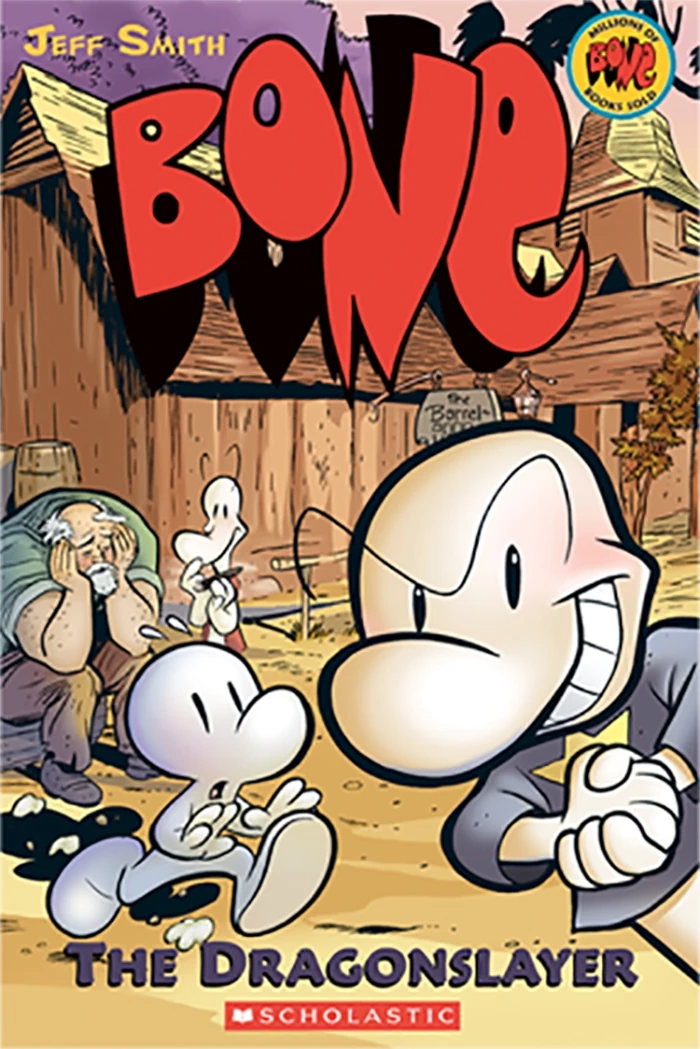
Bone #5 Rock Jaw is one of the shortest books in the series. It follows Smiley and Fone Bone as they go on a separate adventure through the mountains to bring home a baby rat creature. The story is well-paced and introduces new characters and personalities, "Roque Ja" being one of the best.
I like the compassion that Smiley shows to the baby rat creature, whom he has affectionately named "Bartleby." The rat creatures are largely the enemy and have killed friendly animals in the forest. Instead of prejudicing the baby rat creature as a monster like the rest, Smiley takes him as he is, a cuddly baby. Naive, perhaps, but that compassion continues to be the paradox through the running line of this story. Other animals orphaned by rat creatures are less able to welcome in Bartleby, though eventually they begin to judge him on his own merits.
There are many humorous, laugh out loud moments in Rock Jaw. I especially liked the interactions with the two patrolling rat creatures. These two are so silly, that they off-set the darker, more disturbing parts of the story. It is commented on a couple of times that they have eaten Roderick the raccoon's parents, though this is never shown.
First Point to Ponder:
A medallion falls out of Fone Bone's bag pack and scares the cloud of "evil" locusts away. Fone Bone explains that the talisman is part of the local belief system related to dreaming, which Gran'ma Ben and Thorn participate in.
"You mean it's a religion?" Smiley asks.
"It's a religion for Gran'ma Ben and Thorn!"
The animals explain that dreaming is a human thing, and that they believe in something called "hum-hum"--the "hum of the earth." This is how they are able to learn to walk, talk or find food for themselves. The animals then talk about feeling the "hum-hum" near the ancient temple.
The hum-hum makes the whole group of bones and orphan animals hallucinate and see something that is not really there. They realize the power of the locusts, which has caused the dreaming. It is the locusts that have put Kingdok (king of the rat creatures) under its spell. A religious "man of dreams" who controls the locusts is Kingdok's advisor, and he is forcing Kingdok to follow him out of fear caused by the dreaming.
Second Point to Ponder:
Roque Ja argues that happiness is "just an emotion that can be induced" but the only thing of "substance" that matters is "power."
Possum argues: "What about good and evil?"
Roque Ja: "Bah! There is no good and evil. What is evil to you depends on what side you are on. What is good to you is evil to the rat creatures, and vice versa."
Beaver: "It's not true!"
Roque Ja: "Isn't it, my little orphan? Do you think the sun cares if your momma and poppa were eaten by rat creatures? It doesn't. The sun will set tonight and rise again tomorrow whether you and I are here or not. Anything these miserable wretches do is utterly insignificant. There is no good or evil... only nature. And in nature, the only thing that matters is power!"
Fone and Smiley look shocked.
Raccoon: "You're wrong, Mr. Rock Jaw! There's other stuff that matters! Like friendship and trust!"
Roque Ja: "Friendship and trust are merely earthbound sentiments that only lead to trouble. Trust no one. That's my motto."
Roque Ja puts forward a convincing (and contemporary) argument about the absence of good and evil and its replacement with the power-slave struggle. Raccoon's quip about friendship and trust throws Roque Ja's argument to the wind. The cat's weak response "trust no one" tells the mature reader which is the right argument to follow.
What a great moment of depth.



